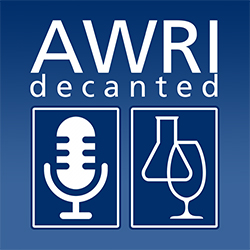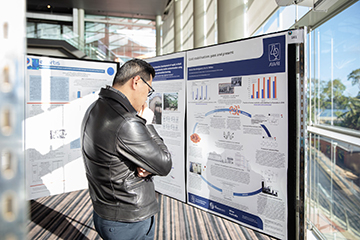Have you listened to AWRI decanted?
New resources on non-chemical control of vineyard weeds
Calling on the grape and wine community to join Sustainable Winegrowing Australia
Stakeholder consultation re: changes to AWRI Board composition and appointment
Register now for spring webinars
Order the latest staff publications online
Have you listened to AWRI decanted? |
|
 |
In September, the AWRI launched the first series of its new podcast ‘AWRI decanted’. This podcast introduces some of the scientists working behind the scenes for the Australian grape and wine industry and discusses how their discoveries are being adopted by grapegrowers and winemakers. So far, four episodes have been released, with new ones coming fortnightly on Wednesdays until early December. The first series centres around the theme of wine flavour. AWRI decanted is available on all the usual podcast apps including Apple Podcasts and Spotify. Subscribe now, so you won’t miss an episode, or if you prefer, listen directly from the AWRI website. |
New resources on non-chemical control of vineyard weedsTo support growers in the adoption of non-chemical weed control practices, the AWRI, with funding from Landcare Australia, has developed a range of resources, accessible from a new Non-chemical weed management webpage on the AWRI website. The resources include several case studies and a decision tool to help growers make decisions about which non-chemical weed control options are best suited to their vineyard. The intention of the decision tool is to narrow down the list of options to consider, rather than providing a single recommendation. Non-chemical weed control workshops were also delivered to more than 300 participants in 11 regions and a webinar was presented to more than 450 participants. The webinar recording, along with all other AWRI webinars, can be accessed from the AWRI’s YouTube channel. For more information on non-chemical options for controlling vineyard weeds, please contact the AWRI helpdesk on 08 8313 6600 or helpdesk@awri.com.au. |
|
Seeking reductive white wines |
|
 |
Do you have a white wine with a reductive character? The AWRI and Charles Sturt University are working on a study to better understand copper addition practices and ‘reductive’ aromas in white wine. A large number of white wines with some degree of reductive aroma are needed for analysis. The researchers leading this study would greatly appreciate if producers could provide examples of wines with sulfide-related aromas. All information regarding the wines will be treated with the utmost confidentiality and no reference to producers will be made. Only information regarding the variety, region, and vintage will be included in the study. This work ultimately aims to provide winemakers with tangible guidance on the best practice use of copper and how to prevent ‘reductive’ aroma formation in white wine. Please contact Dr Marlize Bekker (marlize.bekker@awri.com.au) if you can help or for more information. |
Calling on the grape and wine community to join Sustainable Winegrowing AustraliaGrapegrowers and winemakers looking to demonstrate their sustainability credentials are encouraged to join Australia’s national sustainability program Sustainable Winegrowing Australia – a joint initiative by Australian Grape & Wine, the AWRI and Wine Australia. Consumer and retailer demand for products that can demonstrate they are produced sustainably continues to grow around the world – so now is the time to act. Currently supported by more than 700 grapegrowers and winemakers across the country, Sustainable Winegrowing Australia enables members to measure, monitor and report their vineyard or winery’s environmental, economic and social initiatives each year. This not only allows members to demonstrate their sustainability credentials, it also puts them on the pathway to continually improve their practices. To find out how you can benefit from becoming more sustainable, and prepare for membership, sign up today for a short email series packed with tips. |
|
Stakeholder consultation re: changes to AWRI Board composition and appointmentThe AWRI has been considering some changes to its Board composition and appointment processes over the past 18 months and has conducted a number of initial consultations with industry. Input is now being sought from stakeholders prior to the changes being implemented, with an industry feedback period open until 12 November 2021. A summary of the proposed changes is provided below. If you would like to receive more information, ask questions or provide feedback, please contact AWRI Company Secretary, Shiralee Dodd, at Shiralee.Dodd@awri.com.au prior to 12 November 2021. Key proposed changes:
|
|
Call for AWITC posters |
|
 |
Poster abstract submissions are now open for the 18th Australian Wine Industry Technical Conference, to be held in Adelaide, 26-29 June 2022. All poster abstracts submitted will be considered for the opportunity to present in a ‘Fresh Science’ conference session or at the student forum ‘In the wine light’. Posters presented at the conference are also in the running for a range of prizes. Abstract submissions of no more than 250 words are due by Friday, 11 March 2022. For more information and to submit your abstract, please visit http://www.awitc.com.au/poster-presentations. Poster questions can be directed to the Poster Coordinators (Marlize Bekker and Josh Hixson) via email at posters@awitc.com.au. |
Upcoming webinars – seasonal outlook and vineyard pestsThe final webinar in the AWRI’s current series is coming up on Thursday, 11 November. Dr Paul Bierman from the Bureau of Meteorology will present a summary of the recent rainfall and temperature conditions and an explanation of the climate drivers influencing Australia’s weather over the coming months. He will also cover the Bureau of Meteorology’s temperature and rainfall seasonal outlook for summer. Details and registration here. A week later, our friends at the Bragato Research Institute in New Zealand are presenting a webinar on two insect pests present in New Zealand’s vineyards, but also relevant in Western Australia – the harlequin ladybird and garden weevil. This webinar is scheduled for Thursday, 18 November from 10:30am to 11:30am (Adelaide time). Register here. This webinar will include:
|
|
Order the latest staff publications onlineAccessing the latest AWRI publications is easy. Visit the AWRI Publications web page to:
The AWRI’s most recent publications are listed below. 2247 Culbert, J.A., Jiang, W., Bilogrevic, E., Likos, D., Francis, I.L., Krstic, M.P., Herderich, M.J. Compositional changes in smoke-affected grape juice as a consequence of activated carbon treatment and the impact on phenolic compounds and smoke flavor in wine. J. Agric. Food Chem. 69(35): 10246-10259; 2021. 2248 Culbert, J.A., Krstic, M.P., Herderich, M.J. Development and utilization of a model system to evaluate the potential of surface coatings for protecting grapes from volatile phenols implicated in smoke taint. Molecules 26(17): 5197; 2021. 2249 AWRI. Vineyard management practices to improve soil health. Aust. N.Z. Grapegrower Winemaker (689): 50, 52, 54-56 ; 2021. 2250 Carrau, F., Henschke, P.A. Hanseniaspora vineae and the concept of friendly yeasts to increase autochthonous wine flavor diversity. Front. Microbiol. 12: 702093; 2021. 2251 Onetto, C.A., Borneman, A.R., Schmidt, S.A. Strain-specific responses by Saccharomyces cerevisiae to competition by non-Saccharomyces yeasts. Fermentation 7(3): 165; 2021. 2252 Coulter, A., Cordingley, B., Cowey, G., Dixon, R., Essling, M., Holdstock, M., Longbottom, M., Pitcher, L., Simos, C., Krstic, M. Vintage 2021 – observations from the AWRI helpdesk. Wine Vitic. J. 36(4): 30-31; 2021. 2253 Dry, P. Aligoté. Wine Vitic. J. 36(4): p. 65; 2021. 2254 Essling, M. Ask the AWRI: Best practice weed management and the future of herbicides. Aust. N.Z. Grapegrower Winemaker (692): p. 20; 2021. 2255 Culbert, J.A., Jiang, W.W., Ristic, R., Puglisi, C.J., Nixon, E.C., Shi, H.M., Wilkinson, K.L. Glycosylation of volatile phenols in grapes following pre-harvest (on-vine) vs. post-harvest (off-vine) exposure to smoke. Molecules 26(17): 5277; 2021. 2256 Gnoinski, G.B., Close, D.C., Schmidt, S.A., Kerslake, F.L. Towards accelerated autolysis? Dynamics of phenolics, proteins, amino acids and lipids in response to novel treatments and during ageing of sparkling wine. Beverages 7(3): 50; 2021. 2257 Hixson, J., Pisaniello, L., Parker, M., Grebneva, Y., Bilogrevic, E., Stegmann, R., Francis, L. Methods for predicting and assessing flavour evolution during white wine ageing. Guichard, E., Le Quéré (eds) Proceedings of the 16th Weurman Flavour Research Symposium, May 4-6, 2021. 10.5281/zenodo.5346589: 1-6; 2021. 2258 Wheal, M.S., Wilkes, E.N. Application of multi-isotope calibration to analysis of wine samples by ICP-MS. J. Anal. At. Spectrom. doi: 10.1039/D1JA00269D: 1-8; 2021. 2259 Cowey, G. Ask the AWRI: How much wine to expect per tonne of grapes. Aust. N.Z. Grapegrower Winemaker (693): p. 52-53; 2021. 2260 Ward, C.M., Perry, K.D., Baker, G., Powis, K., Heckel, D.G., Baxter, S.W. A haplid diamondback moth (Plutella xylostella L.) genome assembly resolves 31 chromosomes and identifies a diamide resistance mutation. Insect Biochem. Mol. Biol. 138: 103622; 2021. |
|
AcknowledgementsThe AWRI acknowledges support from Australia’s grapegrowers and winemakers through their investment body, Wine Australia, with matching funds from the Australian Government. The AWRI is a member of the Wine Innovation Cluster in Adelaide, South Australia. |
|

